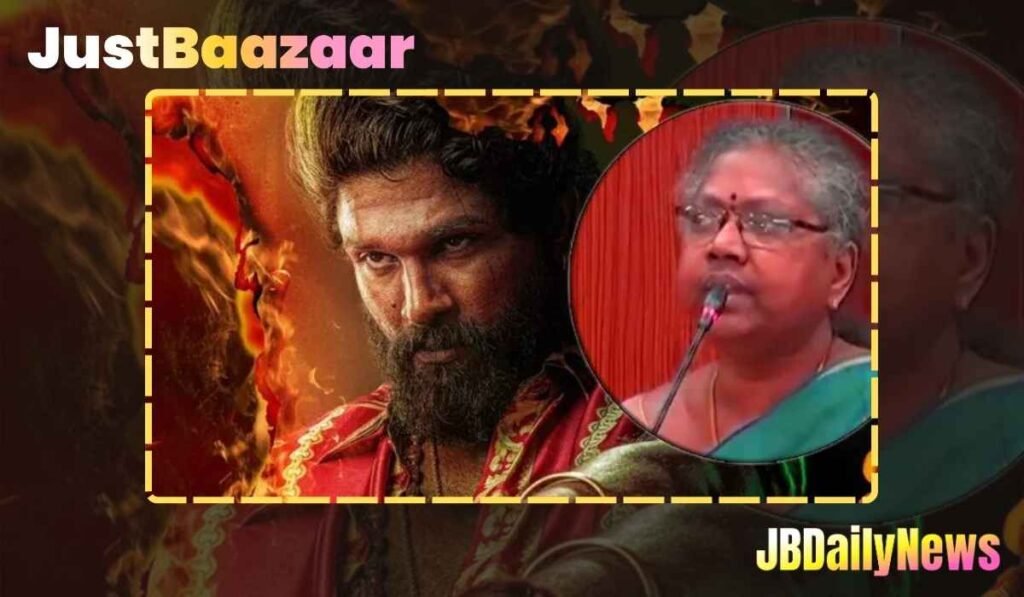The influence of cinema on young minds has long been debated, and in recent times, Telugu superstar Allu Arjun has found himself at the center of such a controversy. The actor’s portrayal in the “Pushpa” film series has drawn criticism from teachers and government officials, with claims that his character’s mannerisms, attitude, and dialogues have negatively impacted students.

While films are primarily a source of entertainment, they also shape culture, behavior, and even societal norms. This raises a critical question: Is Allu Arjun responsible for influencing students negatively, or is it a failure of parental and educational guidance?
Understanding the Allegations Against Allu Arjun and Pushpa’s Influence
The controversy erupted when a government school teacher from Hyderabad’s Yousufguda voiced her concerns about how students were imitating the style and behavior of Pushpa Raj, Allu Arjun’s character from the film.
“Half the students in my school have become worse due to Pushpa. They sport unbearable hairstyles, talk vulgarly, and show aggressive behavior.”
This claim was made during a meeting with the Education Commission, where the teacher insisted that the film had a significant impact on students. She argued that many young boys had started adopting the Pushpa-style beard, rough attitude, and slang language, which was affecting their discipline.
Adding to this, Andhra Pradesh Cinematography Minister Komatireddy also criticized Pushpa 2 for allegedly “ruining the youth.” He suggested that certain films contribute to behavioral changes in students and that filmmakers need to be more responsible about their content.
Why Pushpa’s Influence is So Strong?
There are a few reasons why Pushpa’s impact on students has been significant:
Iconic Character & Mass Appeal:
- Allu Arjun’s Pushpa Raj is a rebellious, fearless, and self-made man.
- His “Thaggede Le” (I don’t bow down)” attitude resonated with youngsters, especially those who relate to themes of struggle and self-determination.
Influence on Style & Behavior:
- The film popularized messy hairstyles, rugged beards, and lungi-clad looks among teenagers.
- Students imitating Pushpa’s body language, finger gestures, and dialogues have raised concerns in schools.
Use of Slang & Aggressive Language:
- The film features raw, street-style dialogues that students find “cool” to replicate.
- Teachers have noted an increase in rude language and dismissive behavior among students.
Social Media Amplification:
- Instagram reels, YouTube shorts, and TikTok (before its ban) played a major role in spreading Pushpa’s catchphrases and mannerisms among teenagers.
Cinema vs. Reality: Are Films Responsible for Student Behavior?
While films do have an influence, it is unfair to solely blame Allu Arjun or any other actor for student behavior issues. The responsibility lies across multiple levels, including parents, schools, and society itself.
1. Parental Responsibility
Parents play the most crucial role in monitoring what their children watch and explaining the difference between fiction and reality.
- Parents should discuss films with their children, emphasizing the entertainment aspect rather than blindly allowing them to imitate characters.
- Supervision is key, especially when kids watch films meant for mature audiences.
2. Role of Schools & Teachers
Schools should encourage media literacy, teaching students how to critically analyze film content rather than blindly copying it.
- Conducting awareness programs on media influence can help prevent negative behaviors.
- Schools should promote positive role models alongside popular film icons.
3. Filmmakers’ Responsibility
While creative freedom is essential, filmmakers should acknowledge their social influence.
- Movies glorifying violence, rebellion, and disrespectful attitudes should carry proper disclaimers.
- Balanced storytelling should highlight both the consequences and morals behind a character’s actions.
Allu Arjun’s Response & Positive Influence
Allu Arjun has never endorsed bad behavior. In fact, he has been a role model in many ways:
- He has promoted Telugu culture and Indian traditions on global platforms.
- His short film “I Am That Change” was a campaign for ethical behavior and social responsibility.
- He is actively involved in charitable causes, helping underprivileged students and healthcare initiatives.
What Can Be Done?
Instead of blaming Allu Arjun or “banning” films like Pushpa, the focus should be on:
✅ Guiding students to distinguish between reel and real life.
✅ Encouraging positive takeaways from films (hard work, resilience, ambition).
✅ Teaching discipline and self-control from a young age.
✅ Making students aware of the importance of respect and education.
Conclusion: Who is Truly Responsible?
The debate over cinema’s influence on youth is not new. Whether it was Rajinikanth’s cigarette flips, Salman Khan’s Dabangg style, or Ranveer Singh’s street swag, students have always been influenced by pop culture.
The real question isn’t whether Allu Arjun is spoiling students, but rather, why are students so easily influenced without proper guidance?
Ultimately, films are meant for entertainment. It is parents, teachers, and mentors who shape a child’s mindset and values. Blaming a film star for societal shortcomings is an easy escape, but true change comes from responsible parenting and education.
सिनेमा सिर्फ़ मनोरंजन का माध्यम नहीं बल्कि समाज पर गहरा प्रभाव डालने वाली कला है। हाल ही में हैदराबाद के एक सरकारी स्कूल की प्रधानाचार्या ने दावा किया कि अल्लू अर्जुन की फ़िल्म ‘पुष्पा 2’ देखने के बाद छात्रों में अनुशासनहीनता बढ़ गई है। उन्होंने कहा कि छात्र गंदी भाषा का प्रयोग कर रहे हैं, बुरे हेयरस्टाइल अपना रहे हैं और शिक्षकों की बात नहीं सुन रहे।
यह सवाल खड़ा होता है कि क्या वाकई फ़िल्में युवाओं को बिगाड़ रही हैं या फिर इसके पीछे कोई और बड़ी सामाजिक समस्या है? आइए, इस विषय पर विस्तार से चर्चा करें।
फिल्मों का प्रभाव: तथ्य बनाम भ्रांतियाँ
भारतीय सिनेमा का समाज पर हमेशा प्रभाव रहा है। कुछ उदाहरण देखें:
- अमिताभ बच्चन की ‘एंग्री यंग मैन’ इमेज (1970-80 के दशक) – इस छवि ने युवाओं को संघर्षशील और विद्रोही बनाया।
- ‘तेरे नाम’ (2003) के बाद सलमान खान का हेयरस्टाइल – यह युवाओं में एक बड़ा ट्रेंड बन गया।
- ‘पुष्पा’ के डायलॉग और बॉडी लैंग्वेज (2021-2024) – “झुकेगा नहीं साला” जैसे डायलॉग्स युवाओं को प्रभावित कर रहे हैं।
लेकिन सवाल यह है कि क्या सिर्फ़ फ़िल्में ही ज़िम्मेदार हैं? अगर ऐसा होता तो हर फ़िल्म देखने वाला बच्चा अनुशासनहीन हो जाता।
हैदराबाद स्कूल विवाद – सच या बहाना?
हैदराबाद के एक सरकारी स्कूल की प्रधानाचार्या ने आरोप लगाया कि ‘पुष्पा 2’ देखने के बाद कई छात्र उद्दंड हो गए हैं। उन्होंने यह मुद्दा शिक्षा आयोग की बैठक में उठाया और कहा कि छात्र नकारात्मक भाषा अपना रहे हैं, असभ्य हेयरस्टाइल रख रहे हैं, और चेतावनी देने के बावजूद अनुशासन का पालन नहीं कर रहे।
👉 लेकिन अगर यह सिर्फ़ फ़िल्म का असर है, तो बाकी छात्र क्यों प्रभावित नहीं हुए? 👉 क्या छात्रों को सही मार्गदर्शन नहीं मिल रहा? 👉 क्या यह फ़िल्मों को दोष देकर असली समस्या से ध्यान हटाने का प्रयास है?
असल समस्या: फ़िल्में या पारिवारिक और सामाजिक तंत्र?
समस्या सिर्फ़ फ़िल्मों की नहीं है, बल्कि हमारे समाज की भी है।
✅ भारत में हर साल लाखों छात्र शिक्षा छोड़ देते हैं क्योंकि उन्हें सही मार्गदर्शन नहीं मिलता। ✅ मोबाइल और इंटरनेट के कारण युवा अब पहले से ज़्यादा प्रभावित होते हैं। ✅ माता-पिता और स्कूलों की भूमिका छात्रों के भविष्य निर्माण में सबसे महत्वपूर्ण होती है।
अगर कोई बच्चा फ़िल्म देखकर गलत भाषा अपनाता है, तो क्या उसे अच्छे संस्कार देने की जिम्मेदारी सिर्फ़ सिनेमा की है? नहीं! यह माता-पिता, स्कूल और समाज का दायित्व है।
समाधान: सिनेमा को दोष देने के बजाय सही मार्गदर्शन
अगर हमें सच में बदलाव लाना है, तो हमें फ़िल्मों को दोष देने के बजाय समाज में सुधार लाना होगा।d
✔ माता-पिता को बच्चों के साथ अधिक समय बिताना चाहिए। ✔ शिक्षकों को नैतिक शिक्षा और अनुशासन को मज़बूत बनाना चाहिए। ✔ बच्चों को बताना होगा कि सिनेमा सिर्फ़ कल्पना है, वास्तविक जीवन नहीं। ✔ उन्हें अच्छे आदर्श किरदारों से प्रेरणा दिलानी होगी।
निष्कर्ष
सवाल यह नहीं है कि ‘पुष्पा’ जैसी फ़िल्में बच्चों को बिगाड़ रही हैं या नहीं। असली सवाल यह है कि क्या हमारा सामाजिक तंत्र इतना कमज़ोर हो गया है कि एक फ़िल्म बच्चों के अनुशासन को बिगाड़ सकती है?
अगर कोई बच्चा ‘पुष्पा’ का संवाद अपनाता है, तो वह भगवद गीता और रामायण से भी प्रेरणा ले सकता है – बस उसे सही मार्गदर्शन की आवश्यकता है।
इसलिए, हमें फ़िल्मों को सेंसर करने या बैन करने की मांग करने की बजाय, बच्चों को बेहतर शिक्षा और परवरिश देने पर ध्यान देना चाहिए। समस्या फ़िल्मों में नहीं, हमारे समाज की प्राथमिकताओं में है।









